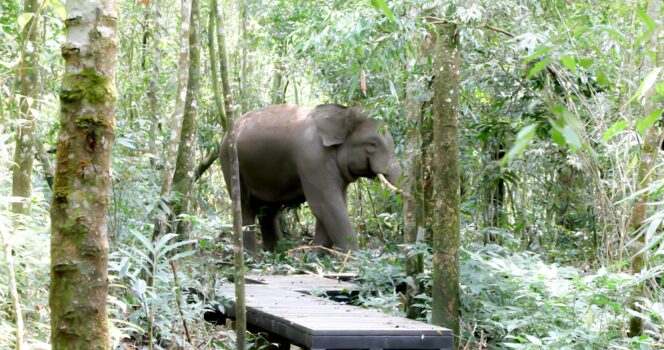
After barging into a restricted forest in India to snap a selfie with a peacefully eating elephant, a tourist was swiftly charged – both by authorities and the massive animal, who trampled him and stripped off his clothes in a dramatic encounter caught on camera.
In a shocking incident that underscores the dangers of ignoring wildlife boundaries, a tourist in India was violently trampled by a wild elephant after attempting to take a selfie with the animal.
The entire ordeal, caught on camera, has since gone viral – and it’s a harrowing reminder of what can go wrong when curiosity crosses into recklessness.
Snacking on carrots
The man, identified as R. Basavaraju, reportedly trespassed into a restricted forest zone near a temple in Karnataka, southwest India, on August 10.
According to tourist Daniel Osorio, who captured the entire incident on film, Basavaraju used a flash to to snap a selfie with the elephant – who was peacefully munching on roadside carrots – from across the road.
However, what seemed like a daring move quickly turned dangerous.
Strips man of his bottoms
Video footage, filmed by Osorio, shows the massive elephant, named Nelly, standing calmly before suddenly raising her trunk and charging in front of a slowly moving car across the road – directly toward the intruder. Basavaraju is seen running in panic but trips and falls on the road, face down, just seconds later.
Quickly catching up to him, the elephant stomps him multiple times, and before running away, she removes his trousers and underwear in the process.
Miraculously, the man manages to get back on his feet and escape, later receiving treatment for his injuries in hospital.
Fined and forced to apologize on camera
Following the incident, Basavaraju was fined 25,000 rupees (less than $300 US) by the Indian Forest Department and ordered to film a public confession.
In the video, he claims ignorance of wildlife safety laws, admitting that his actions were reckless and uninformed.
‘Burst of light startled the animal’
Osorio, who recorded as Nelly responded to the provocation, said the elephant was calm before being startled by the flash from Basavaraju’s phone.
“I filmed this scene on my phone while driving through Bandipur Tiger Reserve, on the road from Tamil Nadu to Karnataka,” the man, under the name thales_yoga, captioned the clip that was shared on Instagram August 10.
“The elephant was calmly eating carrots it had picked up from a passing truck, while a long line of cars patiently waited for it to finish. According to the witness who was in the white car seen in the video, the man involved had used a camera with a flash to take a close-up photo of the elephant. The sudden burst of light startled the animal, triggering the charge.
“Signs along this road clearly state that visitors must remain inside their vehicles. This incident is a strong reminder to follow the rules of wildlife reserves and to let trained authorities – not people on foot – handle situations like this.”
Meanwhile, according to the Sun, the Forest Department echoed the sentiment in a statement: “Such reckless stunts not only endanger human lives but also provoke unpredictable and dangerous animal behaviour.”
Aggressive when teased
India is home to over 30,000 wild elephants, accounting for 60% of the world’s Asian elephant population. While these majestic creatures are often peaceful, experts warn they can become aggressive when threatened, teased, or mistreated.
“When elephants attack humans, the animals are typically beaten and subjected to other punishments, which only increases their frustration and distress,” warns animal rights group PETA.
Wildlife experts continue to urge tourists to respect safety boundaries and understand that these animals are not attractions – they’re unpredictable and often just trying to survive in their rapidly shrinking habitats.
Before sharing this with story with your friends, please let us know what you think! Are you team elephant or team tourist?
READ MORE
- Neglected camel kills owner after hours tied in scorching heat
- Woman who had face ripped off by friend’s pet chimp reveals sound she heard during attack




